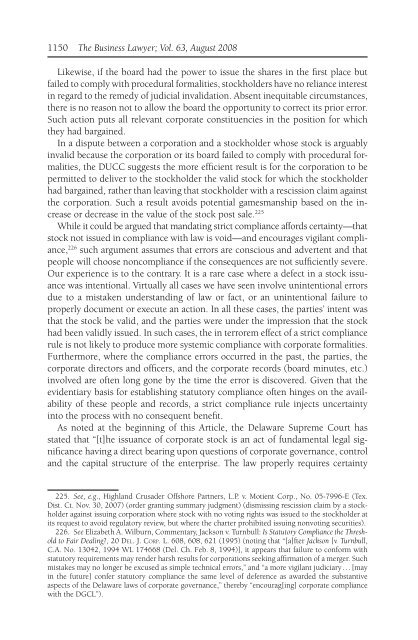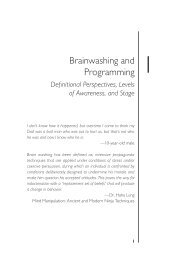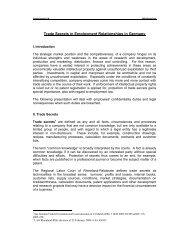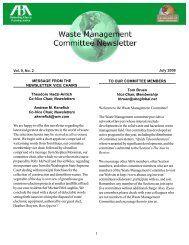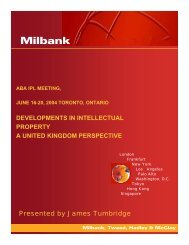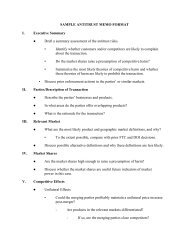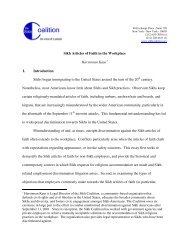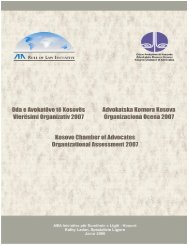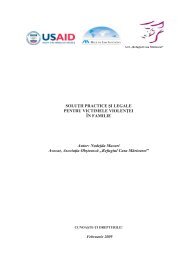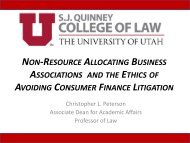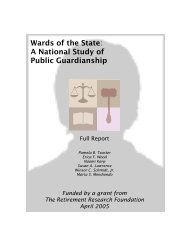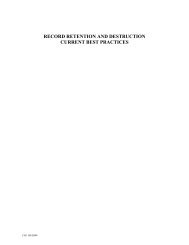Curing Defects in Stock Issuances - American Bar Association
Curing Defects in Stock Issuances - American Bar Association
Curing Defects in Stock Issuances - American Bar Association
You also want an ePaper? Increase the reach of your titles
YUMPU automatically turns print PDFs into web optimized ePapers that Google loves.
1150 The Bus<strong>in</strong>ess Lawyer; Vol. 63, August 2008<br />
Likewise, if the board had the power to issue the shares <strong>in</strong> the fi rst place but<br />
failed to comply with procedural formalities, stockholders have no reliance <strong>in</strong>terest<br />
<strong>in</strong> regard to the remedy of judicial <strong>in</strong>validation. Absent <strong>in</strong>equitable circumstances,<br />
there is no reason not to allow the board the opportunity to correct its prior error.<br />
Such action puts all relevant corporate constituencies <strong>in</strong> the position for which<br />
they had barga<strong>in</strong>ed.<br />
In a dispute between a corporation and a stockholder whose stock is arguably<br />
<strong>in</strong>valid because the corporation or its board failed to comply with procedural formalities,<br />
the DUCC suggests the more effi cient result is for the corporation to be<br />
permitted to deliver to the stockholder the valid stock for which the stockholder<br />
had barga<strong>in</strong>ed, rather than leav<strong>in</strong>g that stockholder with a rescission claim aga<strong>in</strong>st<br />
the corporation. Such a result avoids potential gamesmanship based on the <strong>in</strong>crease<br />
or decrease <strong>in</strong> the value of the stock post sale. 225<br />
While it could be argued that mandat<strong>in</strong>g strict compliance affords certa<strong>in</strong>ty—that<br />
stock not issued <strong>in</strong> compliance with law is void—and encourages vigilant compliance,<br />
226 such argument assumes that errors are conscious and advertent and that<br />
people will choose noncompliance if the consequences are not suffi ciently severe.<br />
Our experience is to the contrary. It is a rare case where a defect <strong>in</strong> a stock issuance<br />
was <strong>in</strong>tentional. Virtually all cases we have seen <strong>in</strong>volve un<strong>in</strong>tentional errors<br />
due to a mistaken understand<strong>in</strong>g of law or fact, or an un<strong>in</strong>tentional failure to<br />
properly document or execute an action. In all these cases, the parties’ <strong>in</strong>tent was<br />
that the stock be valid, and the parties were under the impression that the stock<br />
had been validly issued. In such cases, the <strong>in</strong> terrorem effect of a strict compliance<br />
rule is not likely to produce more systemic compliance with corporate formalities.<br />
Furthermore, where the compliance errors occurred <strong>in</strong> the past, the parties, the<br />
corporate directors and offi cers, and the corporate records (board m<strong>in</strong>utes, etc.)<br />
<strong>in</strong>volved are often long gone by the time the error is discovered. Given that the<br />
evidentiary basis for establish<strong>in</strong>g statutory compliance often h<strong>in</strong>ges on the availability<br />
of these people and records, a strict compliance rule <strong>in</strong>jects uncerta<strong>in</strong>ty<br />
<strong>in</strong>to the process with no consequent benefi t.<br />
As noted at the beg<strong>in</strong>n<strong>in</strong>g of this Article, the Delaware Supreme Court has<br />
stated that “[t]he issuance of corporate stock is an act of fundamental legal signifi<br />
cance hav<strong>in</strong>g a direct bear<strong>in</strong>g upon questions of corporate governance, control<br />
and the capital structure of the enterprise. The law properly requires certa<strong>in</strong>ty<br />
225. See, e.g., Highland Crusader Offshore Partners, L.P. v. Motient Corp., No. 05-7996-E (Tex.<br />
Dist. Ct. Nov. 30, 2007) (order grant<strong>in</strong>g summary judgment) (dismiss<strong>in</strong>g rescission claim by a stockholder<br />
aga<strong>in</strong>st issu<strong>in</strong>g corporation where stock with no vot<strong>in</strong>g rights was issued to the stockholder at<br />
its request to avoid regulatory review, but where the charter prohibited issu<strong>in</strong>g nonvot<strong>in</strong>g securities).<br />
226. See Elizabeth A. Wilburn, Commentary, Jackson v. Turnbull: Is Statutory Compliance the Threshold<br />
to Fair Deal<strong>in</strong>g?, 20 DEL. J. CORP. L. 608, 608, 621 (1995) (not<strong>in</strong>g that “[a]fter Jackson [v. Turnbull,<br />
C.A. No. 13042, 1994 WL 174668 (Del. Ch. Feb. 8, 1994)], it appears that failure to conform with<br />
statutory requirements may render harsh results for corporations seek<strong>in</strong>g affi rmation of a merger. Such<br />
mistakes may no longer be excused as simple technical errors,” and “a more vigilant judiciary . . . [may<br />
<strong>in</strong> the future] confer statutory compliance the same level of deference as awarded the substantive<br />
aspects of the Delaware laws of corporate governance,” thereby “encourag[<strong>in</strong>g] corporate compliance<br />
with the DGCL”).


